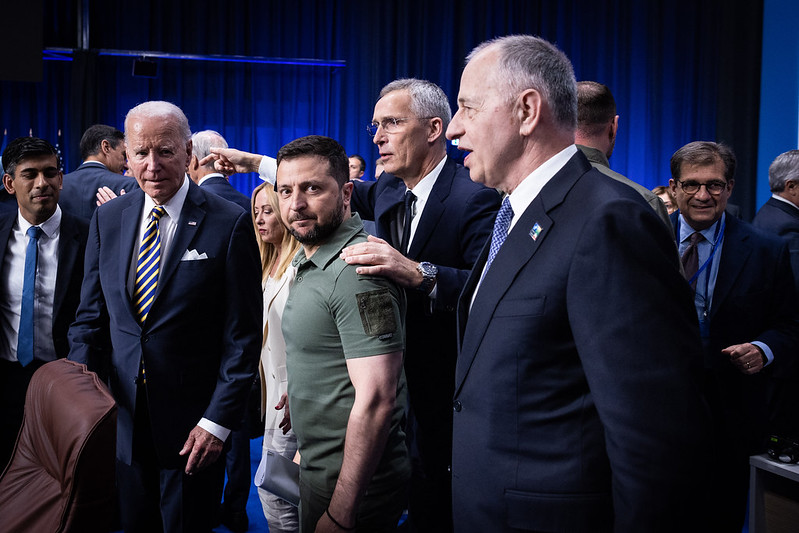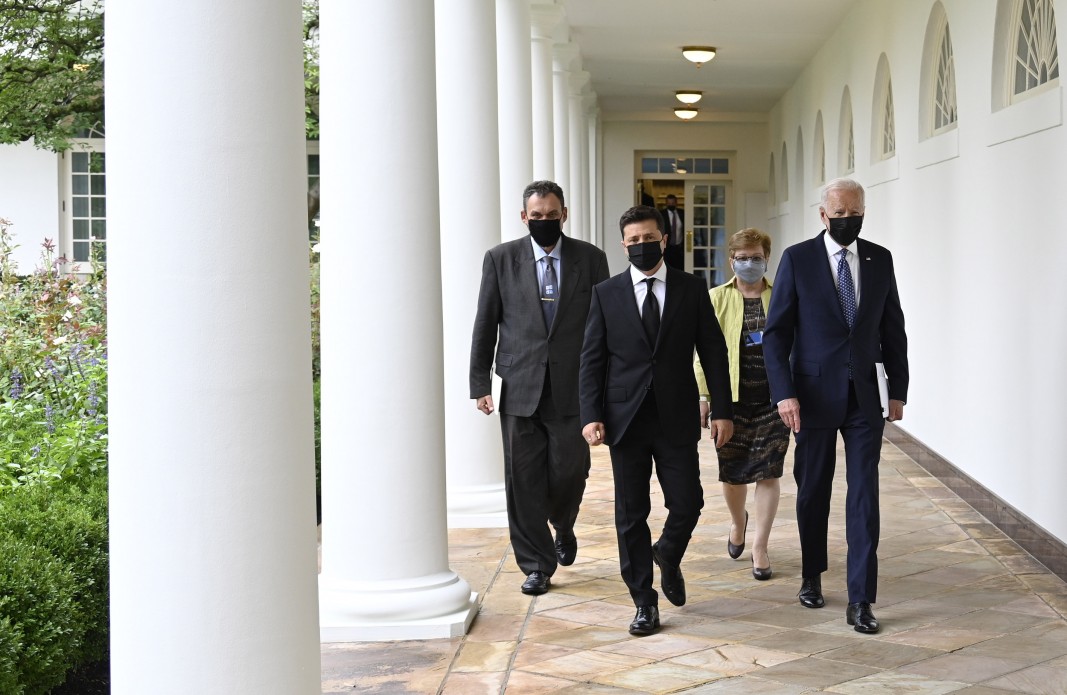Article by: Jonathan Sweet, Mark Toth
Frustration with the Biden Administration is beginning to set in for Ukrainian Commander-in-Chief General Valerii Zaluzhnyi, and understandably so.
It is increasingly difficult for the general to ‘never look a gift horse in the mouth’ as critical weapon systems and munitions produced in the United States – namely ATACMS and F-16s – he deems necessary to prosecute the war against Russia are denied to him. Especially while Russian threats including missile/drone launch sites, troop and equipment staging areas awaiting movement to battlefields in Ukraine, and headquarters that command and control Russian military operations reside on the opposite side of the border in US imposed sanctuary.
These legitimate military targets are "off limits" and remain out of reach due primarily due to constraints placed upon Ukraine by the Biden Administration and modifications secretly made to US provided weapon systems – HIMARS, so they “could not be used to fire long-range missiles into Russia … a precaution the Biden administration says is necessary to reduce the risk of a wider war with Moscow.” This point was made clear by John Kirby on 5 June when he told reporters, “We don’t encourage, we don’t enable and we don’t support strikes or attacks inside Russia.”
According to the Kiel Institute for the World Economy, the US has provided Ukraine upwards of $75 billion in humanitarian, financial, and military support to defend themselves. Last week after the NATO Summit in Vilnius, Lithuania, President Biden reiterated his promise to Ukrainian President Volodymyr Zelensky, “We will not waver … our commitment to Ukraine will not weaken. We will stand for liberty and freedom today, tomorrow, and for as long as it takes. We all want this war to end on just terms.”
No doubt that Zelensky, his generals, and the people of Ukraine remain deeply grateful to the Biden administration and the US for their support in a time of their greatest need when Russian forces threatened the capital city of Kyiv and the country’s fate was in peril.
But that was then. This is now.
17 months have passed, and the war still rages on. The Kremlin’s cruise missiles, drones, and artillery continue to rain down upon Ukrainian population centers, killing and maiming innocent civilians, while Ukrainian soldiers negotiate Russian minefields and engage in close-quarter combat in trenches.
Meanwhile, the Ukrainian counteroffensive is progressing considerably slower than many anticipated. According to a New York Times article, “In the first two weeks of Ukraine’s grueling counteroffensive, as much as 20 percent of the weaponry it sent to the battlefield was damaged or destroyed … The toll includes some of the formidable Western fighting machines — tanks and armored personnel carriers — the Ukrainians were counting on to beat back the Russians.”
Ukraine’s military can ill afford to sustain that loss rate or to become bogged down and decisively engaged. They are built for maneuver warfare. They have finite resources and must choose battles wisely. But extensive defensive belts, seeded with anti-tank and anti-personnel mines are slowing the advance rate and inflicting casualties higher than expected. The time required to build capacity and train the Ukrainian military afforded Russia time to prepare their defensive positions making clearing minefields a priority effort.
De-mining is another unanticipated requirement by Washington that awaits a solution – and provides yet more time for Russia to seed and reseed minefields anew as the war approaches its 18th month.
Ukraine is beginning to grow weary of the US dictating terms of how and where they can fight the Russians. We saw this in Zelensky’s body language at the NATO Summit in Vilnius, and again in his commanding general’s comments in a recent Washington Post article, “This is our problem, and it is up to us to decide how to kill this enemy. It is possible and necessary to kill on his territory in a war. If our partners are afraid to use their weapons, we will kill with our own.”
General Zaluzhnyi added, “To save my people, why do I have to ask someone for permission what to do on enemy territory? For some reason, I have to think that I’m not allowed to do anything there. Why? Because [Russian President Vladimir] Putin will … use nuclear weapons? The kids who are dying don’t care.”
National Security Adviser Jake Sullivan’s response to CNN’s Jake Tapper on the Sunday “State of the Union” show probably did not help much when he said, "The president has given a green light, and we will allow, permit, support, facilitate and in fact provide the necessary tools for Ukrainians to begin being trained on F-16s, as soon as the Europeans are prepared."
Those three words -- “we will allow” -- are pushing Ukraine towards European counterparts for the weapons, munitions, and technology they need to win the war.
The Wall Street Journal recently captured this shift away from Washington, noting, “European nations, once seen as less steadfast in their support for Kyiv and more vulnerable to Russian pressure, are determined to help Ukraine win an unambiguous victory.”
In that same article, Reinhard Bütikofer, a German member of the European Parliament, said, “It took a while, but then it seeped through. Today a lot of leaders around Europe, including Germany, understand that they must help Ukraine defeat Putin if they want to defend their own security. They have well understood that Putin’s threat to Ukraine has significance far beyond Ukraine itself.”
While the US strategy seems to support a war of attrition to "weaken Russia" and bring them to the negotiation table for a political solution, Europeans are increasingly leaning into a Ukrainian victory to bring the war and the Russian threat to an end.
Precision deep strike weapons are at the top of Zaluzhnyi’s list to accelerate the eviction of Russian forces from Ukraine – and the United Kingdom and France have stepped up, providing Storm Shadow and SCALP cruise missiles in the absence of US ATACMS munitions. While the US continued to waffle on F-16 fighter support, European nations pressed the US for authorization to begin training on the aircraft, which the President finally succumbed to this past weekend.
As Vygaudas Ušackas, a former Lithuanian foreign minister and a former European Union ambassador to Moscow pointedly said, “We used to think here that the problem is in Germany, but now it’s increasingly clear that the problem is in Washington.”
Washington may soon be on the outside looking in while Zaluzhnyi increasingly takes matters into his own hands, having lost strategic patience with the Biden administration.
Crimea is likely Zaluzhnyi’s primary target. As he once said, “As soon as I have the means, I’ll do something. I don’t give a damn — nobody will stop me.”
He did just that in Crimea early Monday morning.
Ukraine struck the Kerch Strait Bridge again and the Russian Black Sea Fleet’s naval base in Sevastopol on the anniversary of the Russian downing of MH17 in 2014, with either explosive-laden Unmanned Surface Vessels (USVs), Remotely Piloted Vehicles (RPVs) or cruise missiles. One more step into making the peninsula untenable.
Zelensky and Zaluzhnyi are done doing Washington and NATO’s bidding to "weaken Russia" and secure the alliance’s eastern flank.
It is now all about Ukraine and going for the decisive win.
Col. (Ret.) Jonathan Sweet (@JESweet2022) served 30 years as a military intelligence officer. His background includes tours of duty with the 101st Airborne Division and the Intelligence and Security Command. He led the US European Command Intelligence Engagement Division from 2012-14.
Mark Toth (@MCTothSTL) writes on national security and foreign policy. Previously an economist and entrepreneur, he has worked in banking, insurance, publishing and global commerce. A former board member of the World Trade Center, St. Louis, he has lived in US diplomatic and military communities around the world.





